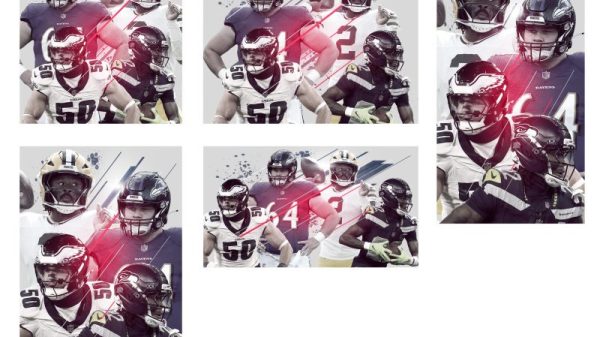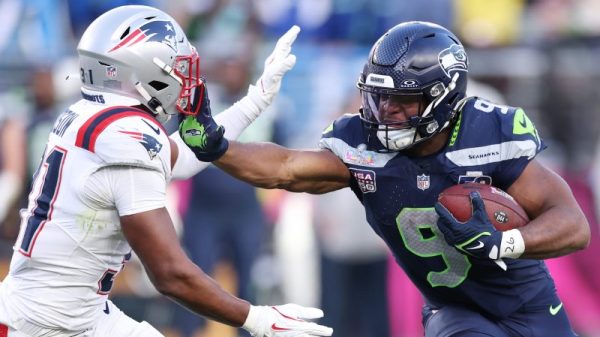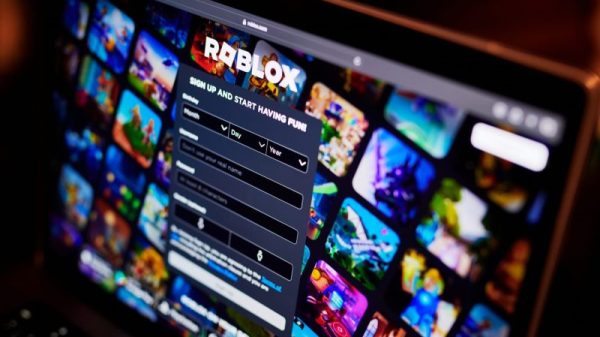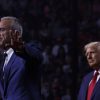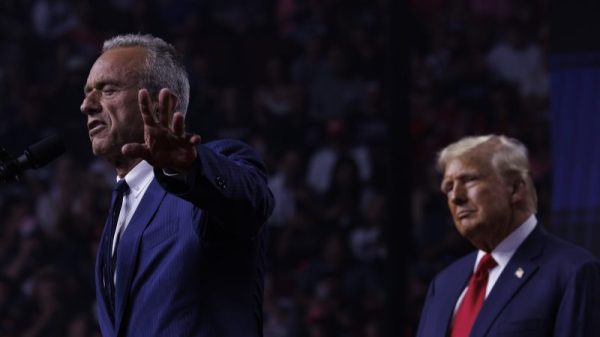After spending more than a week trying to secure a meeting with the president of the United Steelworkers union, Nippon Steel’s Takahiro Mori finally got an answer. But it was not the one he wanted.
“I want to be direct with you,” David McCall, the USW boss, wrote in an April 5 email. “A one-hour meeting between the two of us is not going to address the fatal problems with Nippon’s proposed acquisition of U.S. Steel.”
Ever since announcing a $14.9 billion acquisition of U.S. Steel, Japan’s Nippon Steel had attempted to win the union’s support. But despite repeated promises to guarantee the union’s existing contract, rule out layoffs or plant closures, and spend billion of dollars modernizing the American company’s aging blast furnaces, the Japanese company had come up empty.
“We do not see how this transaction could ever receive [government] approval,” McCall continued, “and given the developments of the past several weeks, we would have expected U.S. Steel and Nippon to recognize the realities and abandon the transaction.”
The email was among nearly two dozen pieces of correspondence between Japanese executives and the union that Nippon Steel shared Tuesday with The Washington Post.
The documents reveal a nearly year-long courtship that seemed doomed from the start. McCall was irked by Nippon Steel’s failure to consult the union before announcing the December merger, which left him doubting its claims.
Nothing that multiple Japanese executives said over the ensuing months came close to changing McCall’s mind. As the discussions proceeded in fits and starts, each side accused the other of misleading the public about its intentions.
In numerous exchanges, Mori, Nippon Steel’s executive vice president, and Hiroshi Ono, the chief executive of Nippon Steel’s North American unit, issued what they said were legally binding commitments to guarantee the union’s existing contract with U.S. Steel. The move would protect steelworkers’ job security, benefits and workplace rules.
But the union demanded additional assurances in a frustrating back-and-forth that ultimately convinced the Japanese company the union was uninterested in making the deal work.
Nippon Steel said it was revealing the correspondence because of “the public mischaracterizations of our communications with the USW and the commitments we have offered.”
In a statement, McCall, of the USW, said: “The bottom line about this merger is that it jeopardizes national security and critical supply chains. We have already provided our members with Nippon’s proposals, all of which show that Nippon Steel has always sought to hide behind its shell company and couch its purported commitments about job security and capital investments in so many conditions as to make their promises worthless. Now USS and Nippon are politicizing the situation in a last-ditch attempt to save the deal.”
From the start, the transaction was shadowed by election-year politics. First, President Joe Biden, and then his replacement on the Democratic ticket, Vice President Kamala Harris, sought the union’s support by saying that U.S. Steel must remain U.S.-owned.
Now, as the presidential campaign moves into its final eight weeks, the president is poised to formally kill the deal. His decision comes after the Treasury-led Committee on Foreign Investment in the United States (CFIUS) recently notified both companies that the transaction raises national security concerns that cannot be mitigated by asset sales or other measures, a judgment many independent analysts doubt.
Mori and U.S. Steel CEO David Burritt are scheduled to meet with CFIUS representatives Wednesday in an 11th-hour bid to salvage the transaction, according to a person familiar with the plans who was not authorized to speak about them to the press.
Within weeks of the deal’s announcement Mori wrote McCall and Michael Millsap, chair of the USW negotiating committee, trying to allay the union’s concerns.
The merged company would create the third-largest steelmaker in the world, he said, one that would be better equipped to compete with the Chinese behemoths that dominate the industry.
Union jobs would be safer after the merger, Mori wrote in a Jan. 5 letter. The combined company would have almost $80 billion in revenue, compared with U.S. Steel’s roughly $18 billion, while net income would jump to $5.3 billion from $1.1 billion.
As McCall continued a drumbeat of criticism, Mori wrote again on Feb. 13 to reiterate that Nippon Steel would assume responsibility for the union’s collective bargaining agreements with U.S. Steel.
At a March 7 meeting in Pittsburgh, Nippon for the first time promised no plant closures or layoffs through 2026. The company felt it was a significant offer, but it did nothing to ease the union’s resistance.
Afterward, McCall sent Mori a four-page letter listing 11 specific requirements he said the Japanese company had yet to satisfy.
The focus in his March 11 letter was the union’s insistence that Nippon Steel — and not its North American subsidiary — needed to assume the legal obligations of the collective bargaining agreement.
To drive home the point, McCall included in his letter a paragraph-long dictionary definition of the word “assume.”
The Japanese executives, noting how quickly the union had issued a post-meeting news release complaining that “Nippon has still not earned the trust of the USW,” concluded the meeting had been staged solely to justify the negative public statement.
Mori and Ono replied the same day, taking issue with McCall’s dictionary reference and flatly rejecting his legal arguments.
“The USW’s strained interpretation of ‘assume’ does not make sense,” they wrote.
Two days later came a bombshell: Biden said publicly that he opposed the takeover, even though the CFIUS review remained incomplete. It was “vital,” the president said, that the company remained American owned.
On March 27, Nippon Steel sent the union the text of a draft agreement that the company said would “memorialize” the commitments it had offered during the meeting. To Nippon Steel, the agreement was an effort to address the union’s complaints, point by point. The company had offered to be financially liable for the union’s agreements with U.S. Steel in the event that the American company defaulted on its obligations and Nippon’s North American subsidiary likewise failed to fulfill them.
But to McCall, it was just “a package of empty promises.” In an April 2 letter, McCall accused the Japanese executives of designing “layers of protection” that would require the union to spend years in court before making the Japanese parent pay.
“For every commitment that the Nippon Parties purport to make, the March 27 proposal envisions a way to release the Nippon Parties from these pledges,” he wrote.
With McCall intransigent and the president publicly opposed to the deal, Mori’s pleas took on a tinge of desperation. On April 3, he emailed McCall, proposing “a one-on-one in-person meeting, lasting up to an hour, so that we can develop our relationship and deepen the dialogue on [sic] a constructive manner.”
When that message went unanswered, Mori tried again the next day, noting that he was running out of time to rebook his flight to the United States.
That finally drew McCall’s April 5 response, which described the problems with the deal as “fatal.”
On May 17, Nippon Steel tried again. It submitted another version of a proposed agreement intended to address the union’s concerns.
Mori emailed that day from Tokyo to request a meeting to discuss their differences. McCall replied that the new letter was no better than its predecessors and that, as a result, “Nippon and U.S. Steel may not proceed with the merger.”
Three days later, Mori replied, regretting that McCall would not meet with him and warning that the union was “missing out on a once-in-a-lifetime opportunity to secure” its members’ livelihoods.
“I will be frank,” the Japanese executive wrote. “I was disappointed by your inaccurate public statement to the USW’s membership on Friday afternoon that we are walking back our public commitments. As you know, in my letter to you, we specifically stated that Nippon Steel is not backing away from any of the commitments previously made.”
Nippon Steel’s guarantees, he said, were “ironclad.”
On May 31, Mori again offered a meeting and McCall again refused, saying “Nothing has changed since we last corresponded, so I assume that your email was sent only to give you something to talk about on your return to the U.S.”
Nippon Steel was “misleading the public about ‘firm’ commitments to U.S. Steel’s integrated operations that are not firm at all,” he added.
On July 8, McCall finally agreed to meet four days later in the union’s Pittsburgh headquarters. But first, he again accused the Japanese company of having “disrespected” the union by not informing it in advance of its December bid for U.S. Steel.
Nippon Steel privately explained the failure by saying that U.S. Steel and its advisers had vetoed the notification while there were competing bids for the company, since the union had aligned itself with U.S.-based steelmaker Cleveland Cliffs.
The 45-minute meeting achieved no breakthrough. When Mori wrote to thank McCall for hosting and express optimism about finding a path forward, McCall responded by emailing him a 47-page collection of union news releases opposing the deal.
As chances of an agreement dwindled, Nippon Steel in recent weeks sweetened the pot. It nearly doubled its planned capital investment program to $2.7 billion, including a new $1.3 billion for the outdated Mon Valley Works outside Pittsburgh and the Gary Works in Indiana.
On Sept. 3, Mori typed one more email to McCall with the subject line, “Our Enhanced Commitments to the USW.”
Former House majority leader Richard A. Gephardt (D-Mo.), who is working for Nippon in its efforts to persuade the union, had recently met with McCall, he noted. But Mori wanted the union boss to hear the good news from him directly.
“One thing I know we agree on,” Mori added, “is trust is crucial to our future relationship.”
As of Tuesday evening, he had received no reply.








